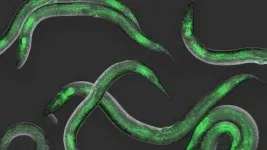(Press-News.org)
ROCHESTER, Minn. — In a randomized trial, published in The Lancet Oncology, Mayo Clinic Comprehensive Cancer Center researchers uncover evidence supporting a shorter treatment time for breast cancer patients. The study compared two separate dosing schedules of pencil-beam scanning proton therapy, the most advanced type of proton therapy known for its precision in targeting cancer cells while preserving healthy tissue to reduce the risk of side effects.
Survival rates for breast cancer continue to improve due to advances in diagnosis and treatment, leading to increasing emphasis on reducing the long-term toxicity of cancer treatment, including radiotherapy.
Prior to this study, all patients treated with proton postmastectomy radiotherapy (PMRT) had received a conventional 25- to 30-day course delivered five days per week over five to six weeks. The researchers hoped to demonstrate that condensing the course of proton beam therapy, a form of particle therapy that could spare the heart and lungs from radiation damage, may result in a similar side effect profile.
Eighty-two patients with indications for PMRT, many of whom had prior breast reconstruction, were randomized to either conventional fractionation (fractions of radiation dose) administered in 25 days, or a condensed 15-day hypofractionated schedule. With hypofractionation, a larger dose of radiotherapy is delivered with each treatment, allowing all radiotherapy to be completed in just three weeks. The investigators found that both conventional and hypofractionated proton therapy resulted in excellent control of the cancer while sparing surrounding normal tissue. Further, complication rates were comparable between the two study groups.
"The study provides the first prospective data supporting the use of shorter-course proton PMRT, including in patients with immediate breast reconstruction, and the first mature results of a randomized trial in the field of breast particle therapy," says Robert Mutter, M.D., a radiation oncologist and physician-scientist at Mayo Clinic Comprehensive Cancer Center. "We can now consider the option of 15 days of therapy with patients based on the similar treatment outcomes observed as the longer conventional course. Of note, the short course actually resulted in reduced skin side effects during and after treatment."
Importantly, the researchers noted that the new schedule spares patients additional inconvenience, cost, and other burdens associated with the longer regimen. As there are a limited number of proton therapy facilities in the United States and the world, Dr. Mutter adds that demonstrating the safety and feasibility of the shorter treatment course could result in greater access to proton beam technology for difficult-to-treat breast cancer cases.
The researchers say additional investigation into the optimal PMRT dose and fractionation is warranted. The team plans additional research, investigating the delivery of PMRT in as few as five days.
"Ultimately, our goal is to personalize radiotherapy based on tumor biology," Dr. Mutter says. "We want to identify the best possible radiotherapy schedules or drug-radiotherapy combinations to eliminate cancer while minimizing side effects."
The research was funded by a grant from the National Cancer Institute, Mayo Clinic, and a gift from Lawrence and Marilyn Matteson. For a full list of funding, authors, and conflicts of interest, see the paper.
Mayo Clinic is expanding its proton beam therapy services in Rochester, Minnesota, with a $200 million facility expansion project expected to open in 2027. Mayo Clinic opened its first Minnesota proton facility in 2015. In 2016, Mayo Clinic opened the Southwest’s first proton therapy facility at its Arizona site. Now, construction is underway on a new, 200,000-square-foot integrated oncology building on Mayo Clinic’s campus in Florida where proton beam therapy will be delivered to patients when available in 2026. The facility also will allow Mayo Clinic researchers to study carbon ion therapy in clinical trials as a potential treatment.
###
About Mayo Clinic Comprehensive Cancer Center
Designated as a comprehensive cancer center by the National Cancer Institute, Mayo Clinic Comprehensive Cancer Center is defining new boundaries in possibility, focusing on patient-centered care, developing novel treatments, training future generations of cancer experts, and bringing cancer research to communities. At Mayo Clinic Comprehensive Cancer Center, a culture of innovation and collaboration is driving research breakthroughs that are changing approaches to cancer prevention, screening, and treatment and improving the lives of cancer survivors.
About Mayo Clinic
Mayo Clinic is a nonprofit organization committed to innovation in clinical practice, education and research, and providing compassion, expertise and answers to everyone who needs healing. Visit the Mayo Clinic News Network for additional Mayo Clinic news.
END
Mayo Clinic study reveals proton beam therapy may shorten breast cancer treatment
2023-09-09
ELSE PRESS RELEASES FROM THIS DATE:
Study reveals human destruction of global floodplains
2023-09-09
A University of Texas at Arlington hydrologist’s study in the Nature journal Scientific Data provides the first-ever global estimate of human destruction of natural floodplains. The study can help guide future development in a way that can restore and conserve vital floodplain habitats that are critical to wildlife, water quality and reducing flood risk for people.
Adnan Rajib, a UT Arlington assistant professor in the Department of Civil Engineering, was the lead author on the published study, “Human Alterations of the Global Floodplains.” His doctoral student, Qianjin Zheng, played a significant ...
MSU research shows table salt could be the secret ingredient for better chemical recycling
2023-09-08
Images
Researchers at Michigan State University have shown that table salt outperforms other expensive catalysts being explored for the chemical recycling of polyolefin polymers, which account for 60% of plastic waste.
The research, published in the journal Advanced Sustainable Systems, shows that sodium chloride could provide a safe, inexpensive and reusable way to make plastics more recyclable.
The team also showed that table salt and other catalysts could be used in the recycling of metallized plastic films — like ...
RESEARCH ALERT: City of Hope scientists identify new therapeutic target for metastatic cancer
2023-09-08
FINDINGS
In a recent study led by Lei Jiang, Ph.D., an assistant professor of molecular and cellular endocrinology, a team of researchers from City of Hope and the University of Texas Southwestern Medical Center, found a potential new target for treating patients with metastatic cancer. Their findings were published in the August 29 issue of the journal Cell Reports.
The goal of the team’s study was to elucidate the role of reductive carboxylation in redox metabolism, a process believed to be important for metastatic cancer. Reductive carboxylation is best known as a metabolic pathway that provides a molecule called acetyl-CoA so that it can be turned into lipids, which ...
McWilliams School of Biomedical Informatics researchers awarded $3.4M NIH grant to understand link between chronic health conditions and Alzheimer's disease
2023-09-08
A three-year, $3.4 million grant to investigate how Alzheimer’s disease is connected to multiple chronic diseases has been awarded to UTHealth Houston researchers by the National Institute on Aging, part of the National Institutes of Health.
To study this, a team led by Xiaoqian Jiang, PhD, principal investigator and professor and chair in the Department of Health Data Science and Artificial Intelligence with McWilliams School of Biomedical Informatics at UTHealth Houston, will build risk trajectory maps for patients using clinical data and electronic health records. Specifically, they will develop electronic health records ...
SwiftPharma and the Population Council pursue agreement to manufacture Griffithsin needed for the development of a fast-dissolving insert for protection against HIV
2023-09-08
September 8, 2023 – SwiftPharma, a Belgium-based manufacturer, and the Population Council, a global nonprofit research organization, have signed a Manufacturing Master Service Agreement for the plant-based manufacture of Griffithsin to further the Council’s development of a Griffithsin fast-dissolving vaginal insert for protection against HIV.
The Population Council has been developing a non-antiretroviral HIV-prevention method containing Griffithsin (GRFT) in a fast-dissolving insert (FDI). This Griffithsin FDI is an on-demand, user-controlled, portable prevention technology in early development ...
What defines a safety-net hospital?
2023-09-08
Safety-net hospitals have a common mission to provide care for Medicaid beneficiaries and those who are uninsured, but there’s no universal definition for these hospitals—complicating efforts to allocate funding.
In a new analysis published in JAMA Network Open and led by researchers at the NYU School of Global Public Health, the research team looked at five established definitions for safety-net hospitals and found that different criteria captured varying hospitals and characteristics. As a result, when the Centers for Medicaid and Medicare Services (CMS) use one definition ...
Heatwaves hitting Antarctica too
2023-09-08
The world saw another year full of extreme weather events resulting from climate change in 2022, from intense storms to soaring temperatures and rising sea levels. Antarctica was no exception, according to new research published this week.
In the 33rd annual State of the Climate report, an international assessment of the global climate published Sept. 6 in the Bulletin of the American Meteorological Society, CU Boulder researchers report that the planet’s coldest and driest continent experienced both an unprecedented heatwave and extreme precipitation last year.
“My hope is that the public starts to see both the fragility and complexity of these ...
These worms have rhythm
2023-09-08
There’s a rhythm to developing life. Growing from a tiny cell cluster into an adult organism takes precise timing and control. The right genes must turn on at the right time, for the right duration, and in the correct order. Losing the rhythm can lead to diseases like cancer. So, what keeps every gene on beat?
Cold Spring Harbor Laboratory (CSHL) Professor Christopher Hammell has found that in the worm C. elegans, this genetic orchestra has no single conductor. Instead, a quartet of molecules works in concert to time each developmental stage. Hammell says this process shares some similarities with the circadian clocks that control human ...
Sleep-wake therapy gives new hope for teens with depression
2023-09-08
Sleep-Wake Therapy Gives New Hope for Teens with Depression
Promoting healthy sleep in teen night owls brings adolescents’ biology and school demands in alignment.
School systems aren’t built for kids who fall asleep and wake up late, the so-called “night owls,” which may help explain why this group of teens is more prone to depression.
Now, researchers at UC San Francisco have found a way to help these kids adjust to their natural sleep-cycle rhythms while still fulfilling their school responsibilities. The findings are a welcome sign for adolescents with ...
Study explores an underappreciated way warmer temperatures will impact ecosystems: Decomposition
2023-09-08
Our world is changing, and warming temperatures will alter our natural ecosystems. Some of these changes will be straightforward, like animal ranges creeping northward as they strive to maintain their ideal temperatures. But other changes will be more complicated, as warming sets off complex chain reactions that reverberate through these systems.
An important process in ecosystems is the decomposition of plant litter, in which dead plant material is broken down by animals, fungi, and microbes, making its nutrients accessible to the next generation of plants. How quickly this breakdown happens — the decomposition ...




